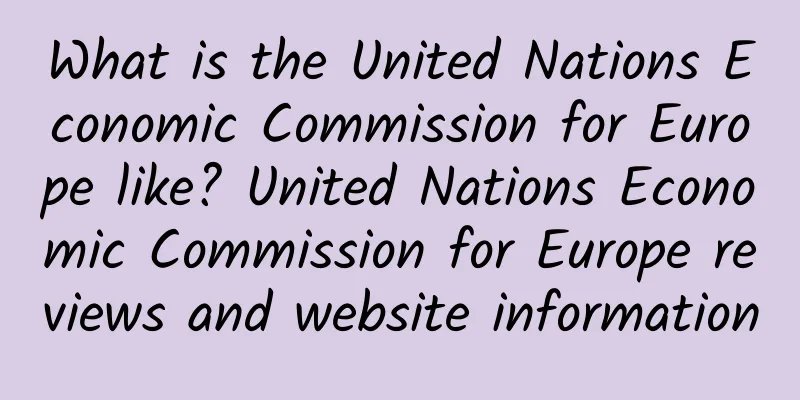What is the United Nations Economic Commission for Europe like? United Nations Economic Commission for Europe reviews and website information

|
What is the website of the United Nations Economic Commission for Europe? The United Nations Economic Commission for Europe (abbreviated as UNECE or ECE) is a branch of the United Nations. It was established in 1947 and is affiliated to the United Nations Economic and Social Council. Its headquarters is located in Geneva, Switzerland. In addition to European countries, its members also include the United States, Canada and other countries. Its main responsibility is to promote economic cooperation among member countries. Website: www.unece.org United Nations Economic Commission for Europe: An international force in promoting regional economic cooperationAs an important regional organization in the United Nations system, the United Nations Economic Commission for Europe (UNECE or ECE) has played a key role in promoting economic cooperation among member states, promoting sustainable development and strengthening regional ties since its establishment in 1947. This article will introduce the historical background, organizational structure, main functions and specific work areas of the United Nations Economic Commission for Europe in detail, and explore its significance in the era of globalization and multipolarization. 1. The establishment and historical background of the United Nations Economic Commission for EuropeAfter the end of World War II, the European continent faced serious economic destruction and social reconstruction challenges. In order to help countries restore economic development and strengthen regional cooperation, the United Nations established the Economic Commission for Europe (UNECE) in 1947. The original purpose of this institution was to coordinate the economic policies of various countries and promote the development of trade, industry and agriculture, thereby laying the foundation for the recovery of post-war Europe. With the deepening development of globalization and the changes in the pattern of international relations, the scope of work of UNECE has gradually expanded to a wider range of fields, including environment, energy, transportation, statistics, housing and land management, etc. Today, it has become a regional economic cooperation platform covering 56 member countries, including not only European countries, but also the United States and Canada in North America, and some countries in Central Asia. II. Organizational Structure of the United Nations Economic Commission for EuropeUNECE is a branch of the United Nations Economic and Social Council (ECOSOC) and is headquartered in Geneva, Switzerland. Its organizational structure mainly includes the following parts:
In addition, UNECE maintains close cooperation with other UN agencies, international organizations and non-governmental organizations to jointly promote sustainable development goals at the global and regional levels. III. Main functions of the United Nations Economic Commission for EuropeAs an important part of the United Nations system, UNECE has multiple responsibilities. Its core tasks can be summarized as follows:
The realization of these functions is inseparable from UNECE's in-depth research and extensive cooperation in various fields. Next, we will explore in detail its performance in specific work areas. IV. Specific areas of work of the United Nations Economic Commission for EuropeUNECE's work covers a number of important areas. The following is a detailed introduction to some of the key aspects: 1. TransportationUNECE's contribution to the field of transportation is particularly outstanding. It has standardized the safety standards and operating procedures of cross-border transportation by formulating a series of international agreements such as the Convention on International Road Transport (ADR) and the Agreement concerning the International Carriage of Dangerous Goods by Rail (RID). In addition, UNECE also actively promotes the development and application of intelligent transportation systems to improve transportation efficiency and reduce carbon emissions. 2. Energy managementEnergy is one of the core elements of modern economic development. UNECE's efforts in the energy field are mainly focused on three aspects: first, formulating energy efficiency standards; second, promoting the development and use of renewable energy; and third, strengthening the transparency and stability of the energy market. For example, the Energy Charter Treaty is an important document led by UNECE to ensure fairness in energy investment and trade. 3. Environmental protectionIn the face of increasingly severe environmental problems, UNECE has taken a number of measures in environmental protection, including signing the Convention on the Protection of Transboundary Watercourses and International Lakes (Water Convention) to promote the rational allocation and use of water resources; implementing the Convention on the Long-Range Transport of Air Pollution (CLRTAP) to reduce the cross-border transmission of atmospheric pollutants; and advocating green economic transformation and encouraging member states to adopt a low-carbon development model. 4. Statistics and data managementAccurate statistics are essential for policy making and evaluation. UNECE has established a sound statistical system in this regard, including population census, economic indicator monitoring and environmental impact assessment. At the same time, it also assists member states in improving data collection and analysis capabilities to ensure the authenticity and reliability of information. 5. Housing and land managementHousing shortages and land use conflicts caused by the accelerated urbanization process are common problems faced by many countries. UNECE helps member countries optimize urban planning and land management strategies to achieve sustainable urban development by developing relevant policy frameworks and technical guidelines. V. Functions and resources of the UNECE websiteVisiting the official website of the United Nations Economic Commission for Europe ( www.unece.org ), users can obtain a wealth of information and resources. The website not only showcases UNECE's various activities and research results, but also provides a large number of statistical data, policy documents and technical guidelines. It is an indispensable source of information for researchers, policymakers and the general public. The main functions of the website include:
VI. The role of the United Nations Economic Commission for Europe in the era of globalizationIn the context of deepening globalization, the role of UNECE is particularly important. On the one hand, it promotes the liberalization of international trade and investment by formulating unified standards and rules; on the other hand, it emphasizes the concept of sustainable development and calls on countries to pay attention to environmental and social issues while pursuing economic growth. In addition, UNECE also actively participates in the global governance process and works closely with other UN agencies and regional organizations to jointly address cross-border challenges. For example, in climate change negotiations, UNECE has repeatedly played a bridging role to coordinate the differences in positions between different interest groups. VII. ConclusionIn summary, as an international organization with a long history and vitality, the United Nations Economic Commission for Europe has made outstanding contributions to promoting regional economic cooperation and achieving sustainable development goals. From its initial post-war reconstruction mission to today's comprehensive platform covering many fields, UNECE has always kept pace with the times and continuously innovated and improved its functions. Looking ahead, as the global political and economic landscape continues to evolve, UNECE will continue to play an important role and contribute to building a more open, inclusive and sustainable world. We have reason to believe that with the joint efforts of all parties, this great cause will surely achieve even more brilliant results. |
<<: How is Thailand's CP Food? Thailand's CP Food Review and Website Information
>>: How is Monster.com recruiting? Monster.com recruitment review and website information
Recommend
How is Neptune Shipyard? Neptune Shipyard review and website information
What is the website of Neptun Werft? Neptun Werft ...
What is St. Edmund's Hall, Oxford like? Reviews and website information of St. Edmund's Hall, Oxford
What is the website of St. Edmund Hall, Oxford Uni...
The efficacy and function of Peruvian pomegranate
Peruvian pomegranates are good for fighting aging...
How is ISBN Lookup? ISBN Lookup Reviews and Website Information
What is ISBN Check? ISBN Check is a website that p...
How is the University of Graz in Austria? Reviews and website information of the University of Graz in Austria
What is the website of the University of Graz in A...
How to make delicious watermelon cup, watermelon cup production steps
Have you ever eaten watermelon soup? This is the ...
The efficacy and function of rose sugar How to eat rose sugar
Rose candy is a traditional food in Dali, Yunnan....
Nutritional value and taboos of eating persimmons
It is the season of persimmon harvest now. Persim...
The efficacy and function of fried ginkgo nuts
Many people have eaten fried ginkgo nuts. They kn...
The efficacy and function of wild eggplant flowers
The scientific name of wild eggplant is Solanum n...
Effects and functions of litchi
Do you all understand the effects of litchi? If y...
Ingredients and steps for cooking scallop and cabbage congee
We are more familiar with dried scallops, which a...
The efficacy and function of the side flower fishing bell willow
The side-flowered Campephagium is a particularly ...
How is El Pollo Loco? El Pollo Loco review and website information
What is El Pollo Loco? El Pollo Loco is a well-kno...
The disadvantages of drinking cola for men The disadvantages of drinking cola frequently
Many men love to drink cola in the summer. Cola t...









